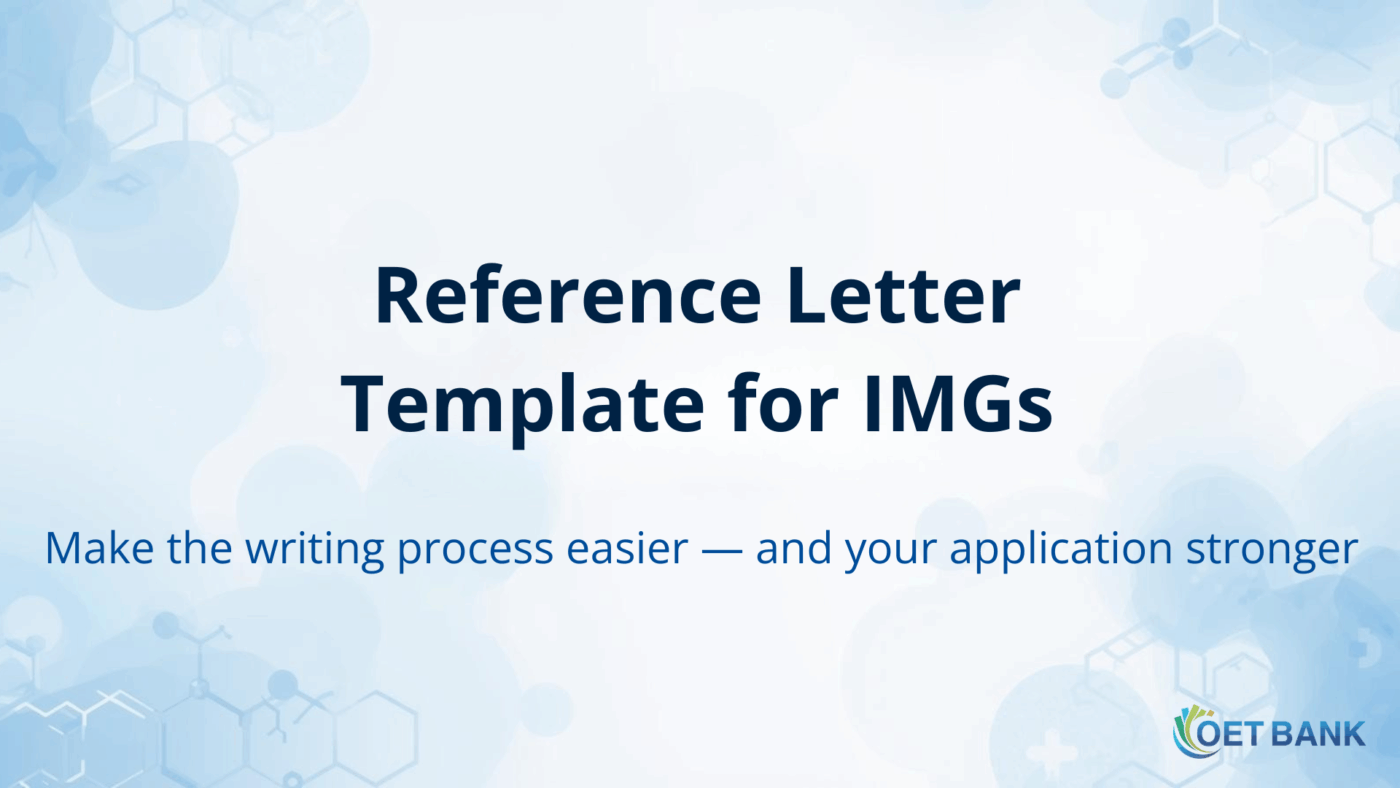Registration & Pathways
Reference Letter Essentials for IMGs: Template and Writing Guide
For IMGs aspiring to train or work abroad, a reference letter in English is one of the most critical documents in your application.
However, in many countries where English is not the primary language, supervisors are rarely asked to write such letters — leading many to say, “I’m not sure what to include” or “It would help if I had a template.”
This article provides a practical, ready-to-use English reference letter template, using examples relevant to specialists in nephrology, dialysis, and general internal medicine.
English Reference Letter Template
Let’s start by looking at the sample structure:
To Whom It May Concern:
I am writing to wholeheartedly recommend [Dr. Name] for a short-term clinical training position at your esteemed institution. As [Your Title/Position] at [Your Institution], I have had the pleasure of supervising [Dr. Name] for [number of years] since [Year]. [Dr. Name] currently serves as [Applicant’s current title/position] in our [Department Name], and in that time [he/she] has consistently demonstrated exceptional medical expertise and professionalism.
Explanation:
This opening paragraph clearly identifies the recommender’s position and relationship to the applicant, stating how long they have known and supervised the doctor. It also expresses a strong, explicit endorsement. If the training program or period is known, it can be added here — for example: “He/She is applying for a three-month clinical attachment beginning in March 2025.”
During [his/her] tenure at [Your Institution/Department], [Dr. Name] has developed outstanding clinical skills in nephrology, dialysis, and general internal medicine. [He/She] has expertly managed a high volume of patients with complex renal conditions, including supervising dialysis treatments (hemodialysis and peritoneal dialysis) and providing comprehensive inpatient care. [Dr. Name] is widely respected for [his/her] excellent clinical judgment, compassionate patient care, and strong teamwork skills, consistently delivering the highest quality of care to our patients.
Explanation:
This paragraph highlights the applicant’s clinical expertise and professional strengths. Emphasize technical areas such as nephrology and dialysis, along with key professional traits — sound judgment, compassion, and teamwork.
In addition to [his/her] clinical accomplishments, [Dr. Name] has made significant research contributions in the field. [He/She] has authored [number] peer-reviewed publications on [specialty/research focus] and has presented [his/her] findings at international conferences such as [Conference Name]. These academic achievements demonstrate [Dr. Name]’s commitment to evidence-based medicine, continuous learning, and advancing medical knowledge in the specialty.
Explanation:
Here, the focus is on academic or research performance. Mention publication count, research focus, and notable presentations to convey the applicant’s engagement with academic medicine.
Overall, I am confident that [Dr. Name]’s exceptional clinical skills, research experience, and dedication will make [him/her] a valuable asset to your program. [He/She] has my highest recommendation for this training opportunity, and I am certain [he/she] will excel in the international training environment and greatly benefit from the experience. If you have any further questions or require additional information, please feel free to contact me at [recommender’s email] or [telephone number]. Thank you very much for your consideration of [Dr. Name]’s application.
Sincerely,
[Recommender’s Name], [Degrees (e.g., MD, PhD)]
[Title/Position], [Department]
[Institution Name]
[Institution Address] (if applicable)
[Email] | [Phone]
Explanation:
The closing paragraph reaffirms the recommendation and expresses full confidence in the candidate’s future success. Optionally, mention language and interpersonal strengths — e.g., “Dr. Yamada is highly proficient in English and adapts quickly to English-speaking clinical environments.”
How to Use the Template
The following section explains how to replace each bracketed placeholder — helping your supervisor write a personalized, accurate letter.
[Name]
The applicant’s full name, e.g., “Dr. Taro Yamada.”
Subsequent mentions can use “Dr. Yamada.”
[Your Title/Position]
The recommender’s position.
Examples:
- Professor of Nephrology
- Director, Department of Internal Medicine
- Consultant Physician
[Your Institution]
Recommender’s workplace.
Examples: Kyoto University Hospital, ABC Medical Center.
[Department Name]
Applicant’s department, e.g., Department of Nephrology or Division of General Internal Medicine.
[Year] / [number of years]
How long the recommender has known the applicant.
Example: since 2018 or for 5 years.
[Applicant’s current title/position]
Applicant’s current title.
Examples: Attending Physician, Nephrology Fellow, Senior Resident, Assistant Professor.
[Institution/Department]
The applicant’s current workplace.
Examples: During his tenure at ABC Hospital or During his tenure in our department.
[specialty/research focus]
The applicant’s research area, e.g., chronic kidney disease management, dialysis outcomes, renal transplantation.
[number] (publications)
Number of peer-reviewed papers authored.
Example: authored five peer-reviewed papers.
[Conference Name]
Name of international conferences presented at.
Example: International Congress of Nephrology.
[Recommender’s Name]
Full name and degree(s), e.g., Dr. Hiroshi Sato, MD, PhD.
[Title/Position], [Department], [Institution Name]
Recommender’s full title and affiliation.
Example: Professor and Chair, Department of Internal Medicine, XYZ University Hospital.
[Institution Address]
Recommender’s institutional address (optional if letterhead is used).
[Email], [Phone]
Professional contact details.
Use international format for phone numbers, e.g., +81-3-1234-5678.
Final Thoughts
We’ve introduced a practical English reference letter template for doctors seeking training or employment abroad.
Instead of asking your supervisor to “write a recommendation in English” without guidance, providing a ready-made structure helps them write confidently and effectively. This approach reduces their burden and ensures consistency and professionalism.
A well-written recommendation letter is often a deciding factor — it highlights not just your qualifications, but also your personality, reliability, and readiness for international collaboration.
Use this template to secure strong, credible endorsements — and take your first confident step toward an overseas medical career.
Study with OET BANK
Stop wasting time comparing OET materials.
With OET BANK, you get:
- Premium-quality OET materials, built by professionals
- A focused, efficient study path — no unnecessary content
- A system designed to help you pass OET once — without trial and error
If you want to prepare properly and pass with confidence,
you don’t need to look anywhere else.
Pick your materials and start today — with OET BANK.




